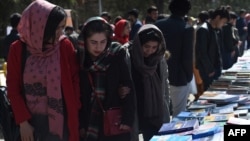“We are really in danger — it is dreadful here now, and they are searching for us,” the 22-year-old Afghan student says.
Esin, like other female students, especially those who also worked with Western embassies, missions and NGOs in the Afghan capital, Kabul, as she did, is desperate to get out of Afghanistan.
Some of her fellow students want to flee because they fear that they won’t be able to continue their academic studies under Taliban rule. Others calculate they will be targeted by wrathful militants.
For Esin, evacuation looks highly likely to be a matter of life or death. But as she explains her plight, she knows her chances of escaping the Taliban are now diminishing by the minute. Her evacuation application has gone nowhere. And this knowledge overshadows her conversation with VOA as she expresses bewilderment about why she and others like her are being left behind.
Esin is in hiding now, along with her mother and two sisters. She has much to fear, and not only because she is a student and worked as a volunteer for the U.S. government.
Two years ago, she broke off an engagement to a young man from her home province. The engagement was foisted on her family. Her fiancé instructed her to stop her studies, and it turned out he was a member of the Taliban.
Since then, the man has been threatening her and her family and he reported them to the Taliban. “He says I am outside of Islam and should be killed and that he will marry one of my sisters according to a cultural rule called Bad dadan, where a girl is given to settle a family dispute. We have had to move several times after he tracked us down. I, and my sisters, are in real danger now that the Taliban rules,” she said in a phone call.
“Can you help?” she asks.
Taliban spokesmen say women have nothing to fear under their rule.
Suhail Shaheen, a spokesman based in Qatar, assured Western broadcasters this week that women “will lose nothing.” The only thing is “they will have to wear a hijab,” he said. “Right now, the teachers have returned to work. They have lost nothing. The journalists — I mean female journalists. They have resumed their work. Lost nothing,” he added.
That is not how many educated Afghan women see it. They say the Taliban is already saying one thing but all too often doing another, and they are certain their plight will only worsen once Western forces are gone and they are left alone with the Taliban.
They are convinced that once again they will suffer the harsh treatment they encountered during the 1990s, the last time the Taliban ruled Afghanistan and imposed their own hard-line interpretation of Sunni Islam. “It will be open season on us,” a 23-year-old schoolteacher told VOA in a phone call.
Restrictions starting
This is the lull before the storm, women contacted by VOA, say. And there are already squalls buffeting them.
Some female broadcast journalists have been allowed back on the air, but others, who worked for the state broadcaster, have reported they have been told not to show up for work. Some female civil servants were instructed last week to leave their ministries. In far-flung provinces the hijab is not sufficient and there are reports that women have been commanded to wear the head-to-toe burqa and told they must not leave their homes unless accompanied by a male relative.
Taliban spokesman Zabihullah Mujahid told reporters this week that some individual fighters and commanders are being excessive, adding that they are “not trained to talk to women.” He said allegations of harassment would be investigated and advised “women to stay home for the time being” until “we have a full system in place.”
Kushaaneh, a 20-year-old student, doesn’t need an invitation to stay indoors. She’s too terrified to go out now. “My mother was a schoolteacher and was badly beaten by the Taliban in the 1990s the last time they ruled Kabul,” she says.
She dismisses what Mujahid said as “presenting a face to the global community, to make it think that maybe the Taliban has changed, but it absolutely hasn't changed,” she said.
She worked voluntarily for the U.S. mission in Kabul for three years and was the deputy director of a women's activist group that’s now disbanded and was part of a network of 16,000 activists. Because of the COVID-19 pandemic much of their activity in recent months has been online in outreach and discussion forums that some activists fear now were being monitored by the Taliban, giving the militants the opportunity to identify activists.
Kushaaneh, her sister and mother swapped apartments as Kabul fell to the Taliban earlier this month after receiving threats from neighbors, who told them they were going to report them to the Taliban. “They knew I spoke English and that I promoted women’s rights and they said I was brainwashing Afghan girls and trying to change their religion,” she says.
The three of them have stayed indoors for the past 10 days, especially as they have no male relatives to accompany them, if they go outside. Two of her brothers — they both once worked for the U.S. Embassy — emigrated to America after one of them was beaten nearly to death by militants.
Adding to her terror is the presence nearby of Taliban fighters, who are manning two checkpoints outside their apartment block. “The other day I asked a male neighbor to buy some groceries,” but aside from that like many other women, she says, we are “prisoners at home, just waiting.” And, she says, wondering why they are being left behind.




